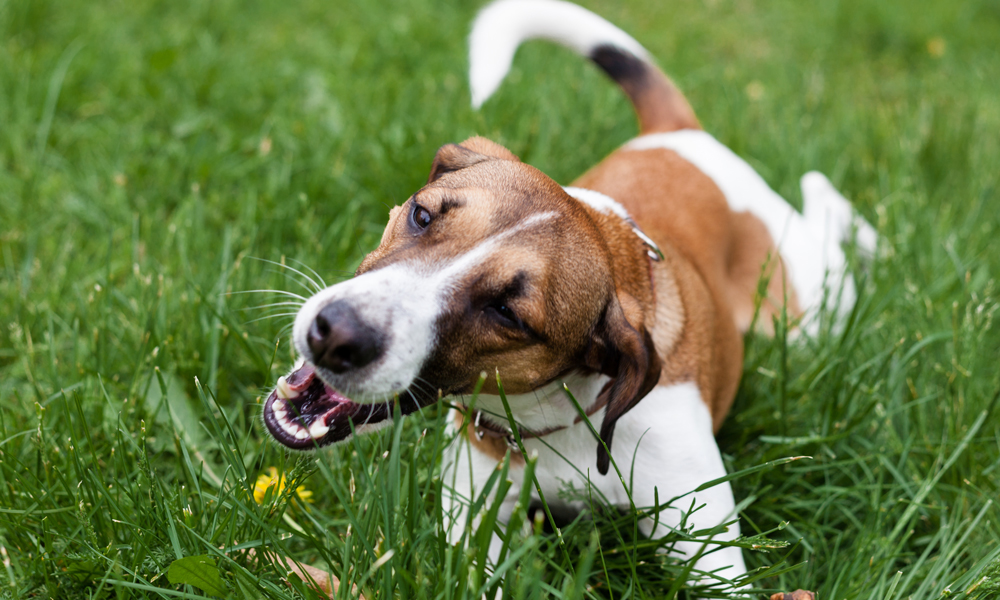When dogs eat grass, it can strike some pet parents as bewildering. Others may hit the panic button out of fear their beloved pet will soon become ill. To help you sort out fact from fiction, we’ll walk through some of the common human beliefs behind this weird-but-normal dog behavior, and what you should do about it.
Can grass upset your dog’s stomach?
When you see your dog nibbling at the lawn, whether you’re on a walk or relaxing in the backyard, you may give a sharp order to stop. The last thing you want is a big mess on the living room rug after you get home!
But the question is, does eating grass really make dogs ill? One study result suggests yes, but not in most dogs. More than three-quarters of pet parents surveyed (79%) said their dog has eaten grass, and of those, only 22% said their dog would vomit afterward, according to the study published in 2008 in the Journal of Applied Animal Sciences.
“Contrary to the common perception that grass eating is associated with observable signs of illness and vomiting,” writes one of the co-authors of the study, “we found that grass eating is a common behavior in normal dogs unrelated to illness and that dogs do not regularly vomit afterward. Vomiting seems to be incidental to, rather than caused by, plant-eating.”
What should you do if your dog vomits after eating grass?
If she seems otherwise fine — no signs of lethargy, ongoing runny stools and weight loss — there’s no need to worry. However, if vomiting is a common occurrence, here are a few other underlying issues you may want to rule out.
- Food allergies/sensitivities that come from eating a poor-quality diet, especially one that contains wheat, corn products and other fillers.
- The dog is eating too many handouts from the table. Make sure the food you share is actually healthy for your dog, and consult our complete list of dog-safe people foods.
Tummy issues can be a sign that it’s time to switch to a high-quality diet containing probiotics and prebiotics. Prebiotics and probiotics bring your pet’s microbiome into balance, helping your dog better digest its food and pass its stools more comfortably. For the most effective formula, look for brands that have, at minimum, 80 million colony-forming units of probiotics listed on the packaging.
So, what makes dogs eat grass, anyway?
Since dogs can’t tell us why they do what they do, we humans are left to decode their behavior. Over the years, this has led to some interesting theories on why dogs eat grass.
The one you probably hear the most is dogs eat grass to soothe their tummy aches. You may have heard it from the vet. When dogs feel queasy, the thinking goes, they have an instinct to gulp down large mouthfuls of grass. Then grass blades tickle the throat and stomach lining, which induces vomiting.
The 2008 study pokes holes in this theory, as only 9% of pet parents say their dog “appeared ill” before eating the plants. And skeptics of this theory point out this raises a chicken-egg question: Does the dog eat grass because he’s feeling unwell, or is he unwell because he ate grass? Without 100% certainty on how the dog feels beforehand, it’s hard to say.
More theories on why dogs eat grass:
- It’s going to rain soon. A possible reason was weather conditions were making their pets feel queasy, so the pet ate grass. (After all, dogs have super-sensitive ears and noses, so why wouldn’t a high-pressure front be felt right in the GI tract?)
- It tastes delicious. Some theorize that grass-eating comes naturally to dogs because wolves also supplement their diets with available plants and grasses. Possibly, canines acquired a taste for the sweet, earthy flavor of grass because it was inside the stomachs of their prey.
- Good old-fashioned negative reinforcement. Dogs are smart. If their habit of eating grass grabs your attention, they’ll catch on pretty quickly. Does this seem to spike when they’re feeling ignored, say, when you pause during a walk to chat with a friend? If so, ignoring the behavior may be your best bet. Otherwise, move on if you’re in an area that was recently treated for weeds and pests, or is a high-traffic area for dogs.
- Boredom. If your dog’s outside much of the day, nibbling on grass may offer your canine something to do.
As long as eating grass doesn’t cause stomach upset in your dog, chalk it up as something that dogs do.
“Who can say for sure why dogs choose to eat what they do?” writes Andrea Rediger for Purdue University. “What makes a rotting carcass and the new sofa such delectable treats?”
Your dog should avoid grass anyway, and here’s why
Even if grass does not bother your dog’s GI system, there are other reasons to put a stop to this habit. Eating grass can lead to your dog ingesting other things that can make him sick.
- Grass that was recently treated with herbicide and pesticide can make dogs sick. They can also ingest these chemicals by licking their paws and pads after a romp on a freshly treated lawn. While most homeowners and municipalities will be considerate and give pet parents a heads-up with signs, not everyone does. So after outings, wipe down their paws to be safe.
- Be wary of grass-eating in public areas, like dog parks and common dog-walking corridors. Even if your fellow pet parents are pretty good about picking up after their pets, your dog is more likely to ingest a pathogen (such as hookworm) that was left behind by other dogs’ fecal matter.
- The habit of eating grass can lead your dog to sample other garden and landscaping plants. Because many varieties of plants and shrubs can be irritating, toxic or deadly to dogs, it’s a smart idea to nip this behavior in the bud. Bookmark the ASPCA’s pet poison control website. If you think your dog ate something he shouldn’t have, refer to the site’s toxic plant guide or call the 1-800 number for help.
3 ways to stop your dog from eating grass
- Keep treats handy during walks, and offer rewards for the behavior you want. When your dog listens after a simple command to stop nibbling on the grass, be ready with that treat! With consistent practice and patience, your dog will eventually get the message.
- Help your dog master the “heel” command. Dogs that heed this command should walk beside you, in line with your pace, without succumbing to distractions, including excessive sniffing around and eating plants.
- Engage in more active play: If you can’t convince your pup to respond to verbal commands to stop, she may be bored. In that case, it’s time to break out the Frisbee or tennis ball. Doing something fun and active with her favorite human is a great way to redirect unwanted behaviors.
Switch to NutriSource for optimal gut health
A healthy body starts with a healthy gut. In addition to using high-quality ingredients — no fillers and no byproducts — each bag and can of NutriSource contains Good 4 Life, an exclusive blend of supplements that offer your dog all the minerals and probiotic nutrients they need to build a healthy gut. Our food has more probiotics, with a minimum of 100 million cfu in every pound, for better digestion. Essential organic trace minerals, like copper, manganese, cobalt and iron, support your dog’s digestion, nourishes their skin and coat and enhances the immune function. Learn more how Good 4 Life supplements found only in NutriSource can make your pet’s diet complete.


